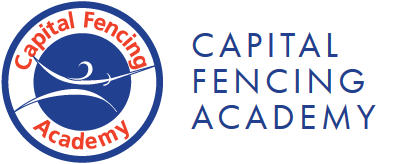Capital fencer Lillie Lainoff
One of my favorite fencing memories is captured in a video: I’m not fencing, but I am wearing my Yale warm-ups, bouncing up and down to keep my muscles warm. A crackling voice announces names over an intercom, and when they reach “Lainoff, Yale” I turn to the camera – I turn to my mother – and I smile so wide my face looks like it might split in half.
I was never supposed to make it to NCAA Championships. I was never supposed to be a competitive athlete… I was never supposed to be an athlete, full stop. And yet, there I was, competing at the highest level of collegiate athletics for Yale University.
Before I started fencing at age 9, I’d tried out almost every sport imaginable. My parents thought a sport would give me an opportunity to spend more time with friends, but also hoped that it would improve my coordination. I was spectacularly clumsy and couldn’t run a mile without being winded. I hated swimming and soccer and ice skating and softball and my parents had just about given up when I begged them to let me try fencing after I saw a demonstration at summer camp. A few months later, I started classes.
To say I wasn’t a natural fencer would be an understatement. But the individual nature of the sport worked for me – and it didn’t require me to catch or throw a ball. I kept pushing and training, and the following year I fenced in my first competition: a Super Youth Circuit in the under-10 age division, where I, to the surprise of everyone – especially myself – finished second. By the time I was 12, I was ranked 10th in my age category nationally.
Things didn’t change at one exact moment. It was just a bit of dizziness at first. But then came the blurry vision, the ringing in my ears, my legs refusal to hold up my own body, my brain’s inability to remember what I was saying mid-sentence. Fencing practices were replaced with doctor’s appointments, traveling to national competitions became traveling to the Mayo Clinic. There, I was diagnosed with POTS, an autonomic nervous system disorder characterized by drastic drops in blood pressure, shortly followed by a wild heart rate – the body’s attempt to force blood up and out of its extremities.
I was lucky to get a diagnosis. I was lucky that years of competitive fencing had toned my legs so that, although my symptoms were awful and my heart rate painfully fast, my blood vessels had an easier time constricting to keep my blood pressure in a range where I wouldn’t faint (at least, not too often). But I didn’t feel lucky having to take so much medicine. I didn’t feel lucky when it took me hours to complete homework that my classmates finished in less than half the time. And I definitely didn’t feel lucky sitting on the sidelines at practice, checking my heart rate while I watched my teammates fence.
Through all this, I wasn’t alone. I had my teammates to encourage and cheer me on. I had my coach, Dariusz Gilman, who could have decided that a sick girl wasn’t worth his time and focused on other students. Instead, he had me take lessons on his rolling office chair. I used my feet to move myself up and down the fencing strip as we worked on ‘green fencing,’ a style he developed for me with an intent of conserving energy. By 10th grade, I slowly started to return to competitions. Coach Dariusz never gave up on coaching me at national events, even when I lost bout after bout.
When it came time for college recruiting, some schools were interested in me, some weren’t. My results were good, not great – but they demonstrated my resilience and commitment to improving my fencing long-term… and my grades showed that I was ready for a challenging academic environment. Being recruited by Yale was a dream come true.
Every time I step on a fencing strip, I feel like I’m fencing two bouts: one against my opponent, and another against POTS. Fencing taught me persistence, to never give up even when everything seemed stacked against me. Fencing gave me perspective: getting stuck with yet another needle for yet another blood test wasn’t so bad – I just pretended they were sabers. Fencing taught me time management: during my junior year of college while fencing for Yale, working as team manager, managing the Yale Daily News Magazine and tutoring at the Yale Writing Center, I wrote a novel.
And fencing helped make me brave. Brave enough to know that even though I will fall, I would somehow find a way to get up again. To me, fencing isn’t just about the competitive results or how it bolstered me in my fight against POTS. I love this sport. Fourteen years later, I’m still fencing and coaching, and I’ll never, ever give it up.

